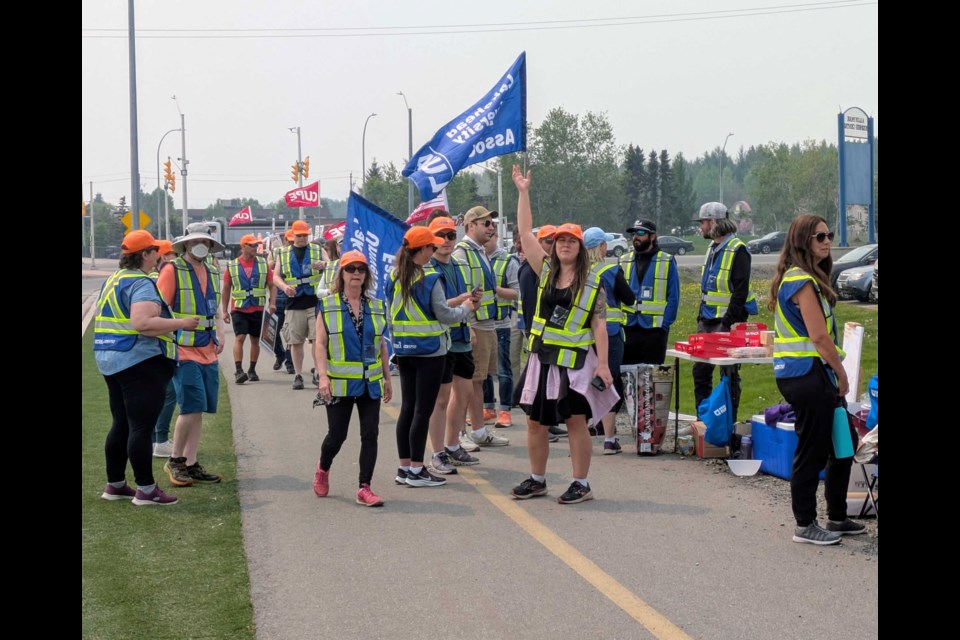THUNDER BAY – Three weeks into a strike, talks between Workplace Safety and Insurance Board employees and the provincial agency have broken down.
The WSIB has rejected the union's most recent collective agreement proposal, according to a media release issued Monday by CUPE local 1750, the Ontario Compensation Employees Union, which represents WSIB workers province-wide.
"The WSIB is at the table, ready to land a deal, as it awaits a meaningful response from the union," said the agency in their own media release Monday.
Fiona McKenna, picket line leader, told Newswatch in an interview that her members are “very disappointed.”
“We think that the stalling that management is doing is jeopardizing the businesses and the workers of Ontario. The essential services that have been stalled are going to result in extreme hardship for the workers and the businesses, and the employers in Ontario,” McKenna said.
“We want to get back to work. We love our jobs. We're skilled professionals. We want a fair collective agreement that treats workers with respect at the WSIB and puts a stop to the conditions that cause burnout and the inability for us to do a good job with our workers and our employers.”
The union says they want fair wages, safer workplaces and an end to the outsourcing of Ontario jobs to U.S.-based firms.
This is the first full-scale work stoppage in the WSIB’s 110-year history.
NDP MPP Lise Vaugeois, shadow minister for seniors and accessibility, marched with union members Monday.
She told Newswatch in an interview that the WSIB has an employee turnover rate of 35 per cent.
“That tells you that there's a real problem in that workplace,” Vaugeois said.
As a return-to-work specialist with the WSIB, McKenna said her coverage area is from White River to the Manitoba border.
Her caseload takes her all over the region to meet with injured workers.
McKenna said that her job is not a typical nine-to-five. Routinely, she would start her day driving four or five hours to meet with an injured worker and then prepare a meeting document and response to a case manager within 24 hours.
“The case managers have many, many more cases that they carry and try to keep them on track, but they can't keep them on track because they have too much work in one day to perform. And the WSIB management, for some reason, doesn't understand what we've been saying,” McKenna said.
“And the public will say: 'I never get a call back.' The injured workers say: 'I have never heard from my case manager, and I've had three or four together, and you're the first person to tell me about my rights and my ways that I can get paid back for my expenses'.”
McKenna said about 40 to 50 calls from injured workers go unanswered daily.
“We're not the employer that's structuring the work. We're just saying it's untenable,” she said.
McKenna also said on top of covering the region, local employees also “cover out of the region cases because Toronto can't retain enough staff.”
“I'm covering French school boards in Southern Ontario. We're covering lots of work from Southern Ontario. When they need help, we cover. And it's very interesting, but it's not the same service because our jobs are designed to go and see workplaces and assess work,” McKenna said.
Vaugeois said the burnout among WSIB employees makes it difficult to help the injured workers they serve.
“We know that 50 per cent of injured workers with permanent injuries wind up living in poverty. That's not supposed to happen with the system that we have. And those workers wind up having to use social assistance, and that's also not what the program was intended to do. WSIB lost its way,” Vaugeois said.
“If you people may recall, it used to be called the Workman's Compensation Board, and when Mike Harris was premier, he changed it to the Worker Safety Insurance Board. It's a very clear change of philosophy from a board designed to support workers when they need that support to a board designed to save money.”
In April, the Ford government announced a it was giving companies a $2 billion WSIB rebate as part of an $11 billion corporate relief package aimed at helping companies impacted by U.S. tariffs. This was in addition to another $2 billion rebate announced in November and distributed in March.
"Some of those employers are probably good, but we don't know. We don't actually know because there's this thing called the experience rating and that incentive for employers not to report accidents, so that they get more of a refund back at the end,” Vaugeois said.
So, the whole system has been twisted out of shape to not serve injured workers and then to squeeze blood out of the people who are supposed to be serving those injured workers.”
In its Monday media release, the WSIB said 60 per cent of union members earn over $100,000 and that with the WSIB-proposed wage increase over 73 per cent of OCEU members would be earning over $100,000 by 2027.
The WSIB also said they reduced employee caseloads by 60 per cent in 2021, as well as adding 100 new employees to its case management team.
The agency also proposed to enhance its joint workload committee with dedicated resourcing to help speed up claims to reduce the caseload further.
